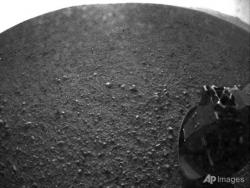Search the Community
Showing results for tags 'mars'.
-
From CNA: http://www.channelnewsasia.com/stories/afp...1238785/1/.html Life on Mars? Maybe not: NASA Posted: 22 November 2012 0755 hrs In this photo provided by NASA's JPL, this is one of the first images taken by NASA's Curiosity rover, which landed on Mars on August 6 (AP Photo/NASA/JPL-Caltech) WASHINGTON: NASA downplayed Wednesday talk of a major discovery by its Martian rover after remarks by the mission chief raised hopes it may have unearthed evidence life once existed on the Red Planet. Excitement is building over soon-to-be-released results from NASA's Curiosity rover, which is three months into a two-year mission to determine if Mars has ever been capable of supporting microbial life. Its Sample Analysis at Mars (SAM) instruments have been sending back information as it hunts for compounds such as methane, as well as hydrogen, oxygen and nitrogen, that would mean life could once have existed there. In an interview with US broadcaster National Public Radio, aired Tuesday, lead mission investigator John Grotzinger hinted at something major but said there would be no announcement for several weeks. "We're getting data from SAM," he said. "This data is gonna be one for the history books. It's looking really good." A spokesman for NASA's Jet Propulsion Laboratory, which is managing the project, appeared to pour cold water Wednesday on the hopes of space enthusiasts looking forward to an earth-shattering discovery. "John was delighted about the quality and range of information coming in from SAM during the day a reporter happened to be sitting in John's office last week. He has been similarly delighted by results at other points during the mission so far," spokesman Guy Webster told AFP. "The scientists want to gain confidence in the findings before taking them outside of the science team. As for history books, the whole mission is for the history books," Webster said. Scientists do not expect Curiosity to find aliens or living creatures but they hope to use it to analyze soil and rocks for signs the building blocks of life are present and may have supported life in the past. The $2.5 billion Curiosity rover -- which landed in Gale Crater on the Red Planet on August 6 -- also aims to study the Martian environment to prepare for a possible human mission there in the coming years. US President Barack Obama has vowed to send humans to the planet by 2030. - AFP/fa
-
from Yahoo : Apply to move to outer space as Mars One opens for applications AFP Relax
- 22 replies
-
- Applications
- Open
-
(and 1 more)
Tagged with:
-
Permanantly.. anyone interested? THE HAGUE, Netherlands: As the world marvels at the latest US Mars landing, a Dutch start-up is aiming to beat NASA at its own game by sending the first humans to the red planet -- and film all as a reality show. The big hitch: it's a one-way trip. Fact, fiction or publicity stunt from the land that launched reality TV? The start-up, called "Mars One", says it is dead serious about landing four astronauts on Mars by 2023, seven years ahead of the US space agency's target, and plans to start the search for volunteers next year. Experts are sceptical, but "Mars One" has won backing from none other than Dutch Nobel laureate Gerard 't Hooft, who won the 1999 prize for physics. "My first reaction was: 'this will never work'. But a closer look at the project convinced me. I really think this is possible," 't Hooft told AFP. No one has yet tried to put man on Mars and scientists question whether radiation exposure would even allow humans to survive the trip. As for space agencies' attempts since 1960 to land unmanned craft, only about half have succeeded, with the US in the clear lead. And though six missions did make it to Mars -- including NASA's Curiosity rover that set down Aug 5 to hunt for signs of past life and prepare for a possible human mission -- scientists have no way, yet, to get spacecraft back. Sound discouraging? Not to the man behind "Mars One", mechanical engineer Bas Lansdorp, 35. He estimates its pricetag at a hefty $6 billion, more than twice the $2.5 billion for Curiosity, NASA's biggest mission yet, and said the idea for financing came after talks with Paul Romer, one of the Dutch creators of "Big Brother", the first reality show in 1999 that was a smash hit and spawned versions, and big profits, worldwide. "Funding will be made possible through the media spectacle built around the adventure," he told AFP. For Lansdorp, "the conquest of the red planet is the most important step in the history of mankind," even if he concedes that many aspects of "Mars One" are still uncertain. Among these are the ethics and legality of asking people to finish their lives in outer space, under TV scrutiny. Other critics say "Mars One" seems more focused on the monetisation -- rather than the feasibility -- of the project. Under Lansdorp's plan, choosing and training the astronauts, their months-long space journey and their lives on Mars would all be televised -- along the lines of "Big Brother" where a small group was isolated in a house and constantly filmed by TV cameras. 'Possible, in theory' The Dutch engineer, who previously worked in the field of wind power, has teamed up with a physicist, an industrial designer and a communications specialist. They would run the operation, he said, and technical aspects like building a space ship and living quarters on Mars would be outsourced to companies that were "most qualified". He has even drawn up a schedule. Selection and training of astronauts is set to start next year, then modules for the space station, food and robotic vehicles would be sent between 2016 and 2022. A first group of four men and women would set foot on Mars in April 2023, Lansdorp told AFP, with others to follow until there was a colony of 20 people a decade later. They would mainly conduct scientific experiments, notably looking for signs of life, like Curiosity. On a planet with an average temperature of minus 55 degrees C (minus 67 F) whose atmosphere mainly of carbon dioxide, Lansdorp said oxygen would be produced from water found below Mars' surface. For Chris Welch, an engineering professor at France's International Space University in Strasbourg, getting oxygen this way was "possible in theory" but highly uncertain. And "landing a person on Mars -- why not?" he said. "But landing four people and keeping them alive on one spot -- that's much harder. "From a technical standpoint, I'd say it's fifty-fifty -- but it's still a courageous try," said Welch, who also questioned whether $6 billion could be raised "via television". At the European Space Agency, Jorge Vago, an expert on its Mars exploration project "ExoMars", said turbulence on the planet made it virtually impossible to land two craft at the same place, as foreseen by "Mars One". "If the robot vehicle which has to build the living module lands 100 kilometres (62 miles) or even 20 kilometres away, it will be very difficult." He also said eruptions from the sun that release ionised material into space could "burn" astronauts and damage their ship. Despite the doubts, a firm note of support has also come from the Netherlands own Space Society, the umbrella group for Dutch companies working in the space industry. Its chairman Gerard Blaauw called Lansdorp's plan a "visionary idea to combine media and aerospace", in comments on the "Mars One" website, saying "this merger...alone means Mars One is worth watching!" -AFP/sb http://www.channelnewsasia.com/stories/fea...1220637/1/.html
-
yahoo.com Featured video clip http://www.yahoo.com/ for 25th jan 2008 man on mars a pic taken by NASA..
-
Bros who hv read the above book, plse share whether this book sums up the general behaviour of the Male Species... Would those bros get this book for their gfren/wives to read to hv a better understanding of how the Male Species function?








